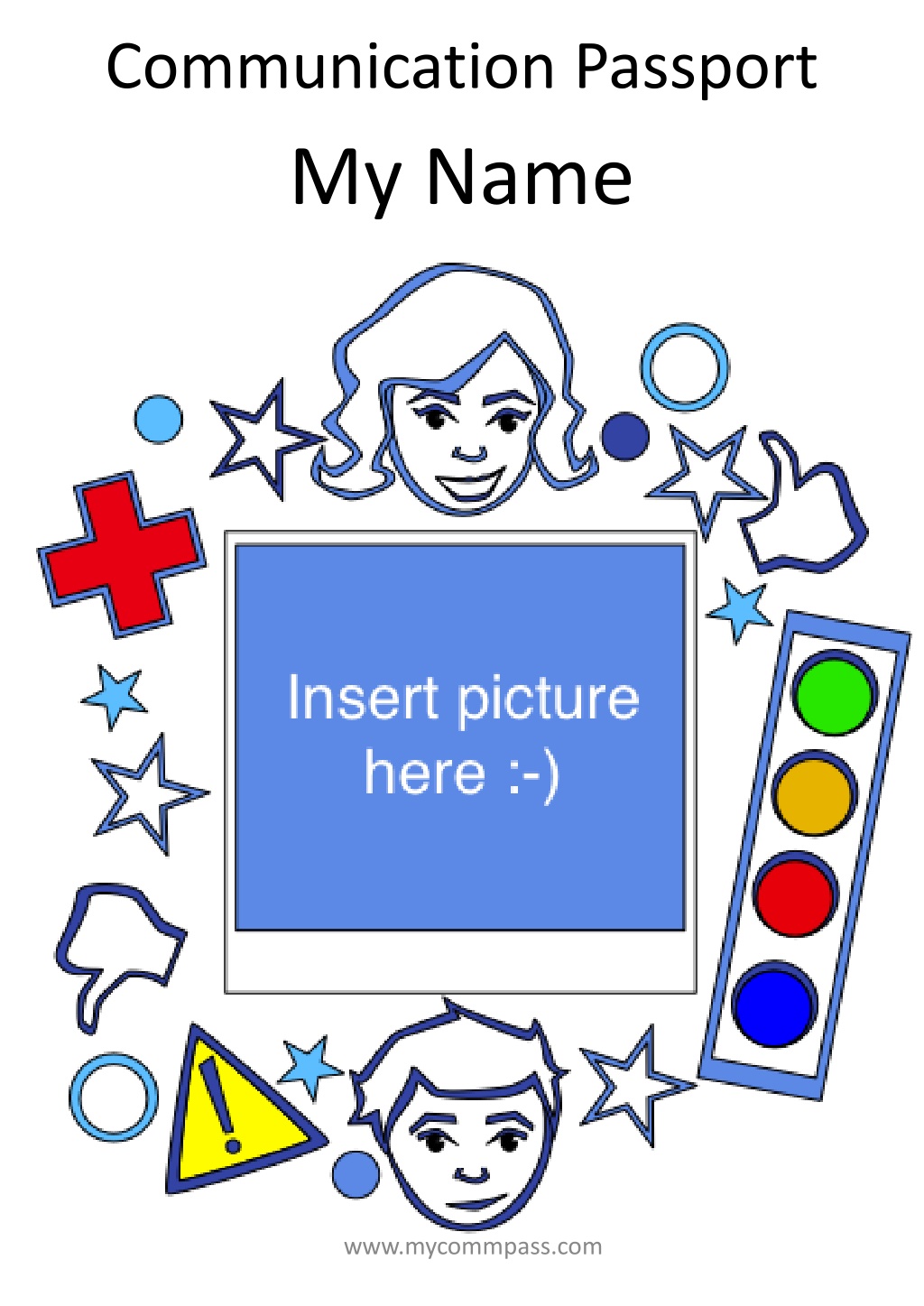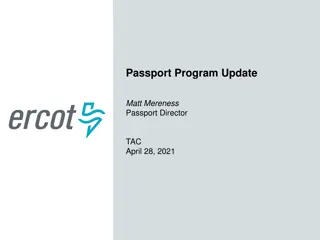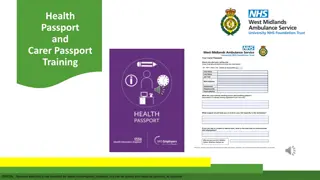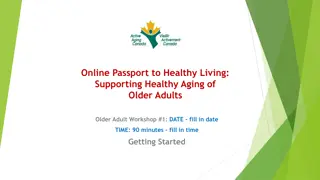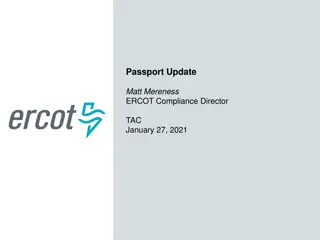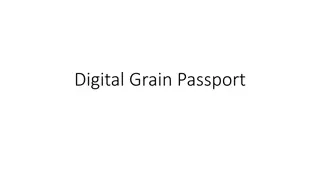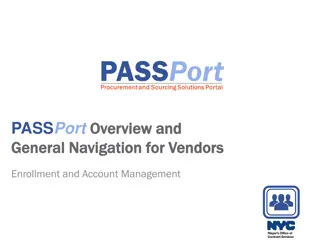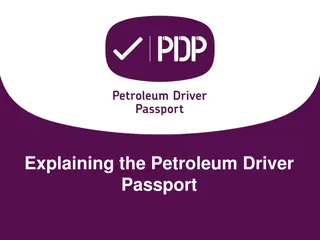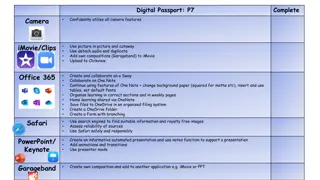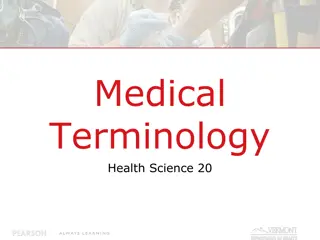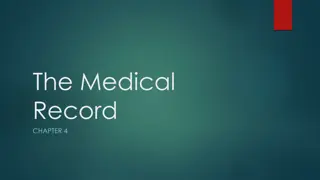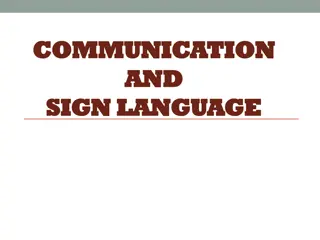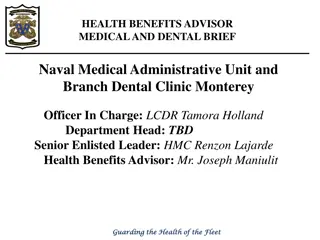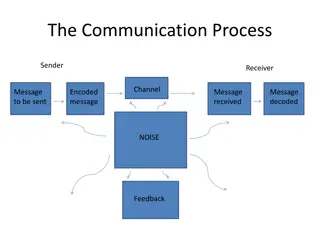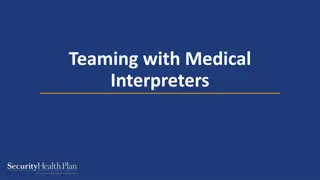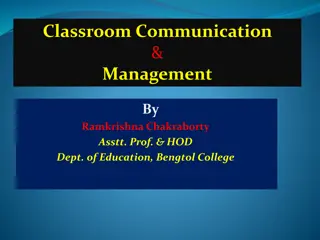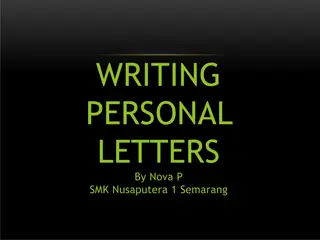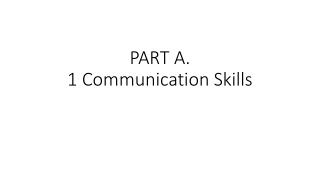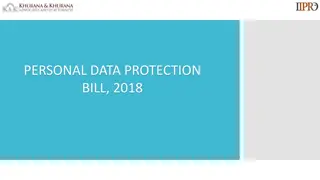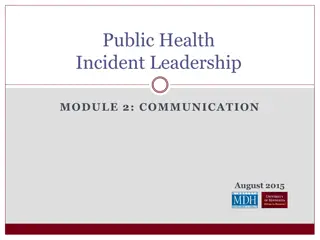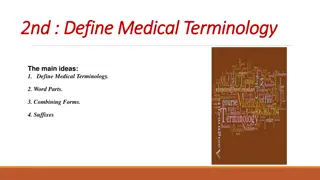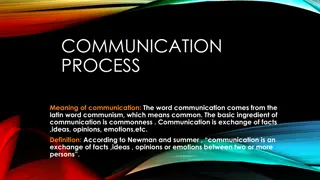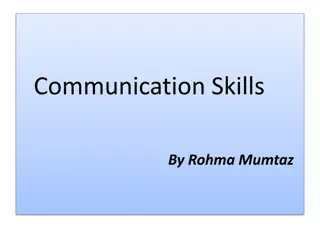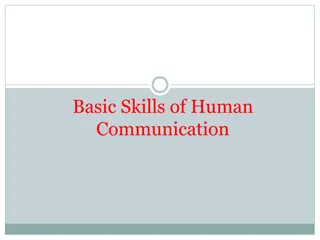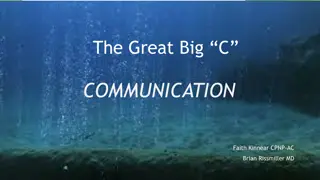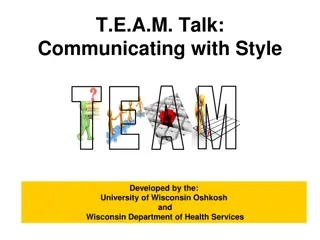Communication Passport: Personal Information and Medical Details
This Communication Passport provides detailed information about emergency contacts, current medication, diagnosis, and communication preferences for better understanding and care. It includes essential details such as medication schedules, cognitive impacts of a diagnosis, and tips for effective communication, helping caregivers and healthcare providers offer tailored support. The document aims to enhance communication and provide comprehensive insights into the individual's needs and preferences.
Download Presentation

Please find below an Image/Link to download the presentation.
The content on the website is provided AS IS for your information and personal use only. It may not be sold, licensed, or shared on other websites without obtaining consent from the author. Download presentation by click this link. If you encounter any issues during the download, it is possible that the publisher has removed the file from their server.
E N D
Presentation Transcript
Communication Passport My Name www.mycommpass.com
Communication Passport Hi! Here is where you can welcome people to your Communication Passport. It s a good time to introduce yourself and tell people why it is that you want them to read your Passport. www.mycommpass.com
Contents Contents lists are great because they prepare the reader for what they are about to read. ---- It also helps the reader navigate to reference points they want to revisit. ---- ---- ---- www.mycommpass.com
Emergency Contact Information Relationship Name Contact Details Relationship Name Contact Details Relationship Name Contact Details Relationship Name Contact Details Medications: Medication? Medication? Medication? ALLERGIES? Medication?
Current Medication Time Medication Administration Time Medication Administration Time Medication Administration Time Medication Administration Notes: Is there anything else that might be useful for someone to know about this medication? Does the medicine taste bad so it s a good idea to have a drink nearby? How flexible are the listed times?
My Diagnosis Here is where you get to write about any diagnosis you might have, and say how it affects your abilities. How does your diagnosis affect you? Check out the points below: Cognitive skills How does your diagnosis affect your ability to understand & learn things? Speech & language How does your diagnosis affect your ability to communicate verbally? Do you always understand the things you say? Behaviour Does your diagnosis affect your behaviour by causing you discomfort or confusion? Medical What are the specific medical problems that come with your diagnosis? Is there anything that you want to say about your physical characteristics with regard to your disorder? Or maybe some general information on how your disorder works. www.mycommpass.com
Communication In these pages write things that the reader needs to know so they can understand you & the way you communicate best. What things should a care worker do to communicate with you? Please do: Do you need extra time to think about what I ve said? Do you struggle with complex sentences? Do you understand better when there are visual aids? Do I need to confirm that you ve understood what I ve said? Examples of things that help you communicate: do you like music? Art? Gestures? Objects of reference? www.mycommpass.com
Communication In these pages write things that the reader needs to know so they can understand you & the way you communicate best. What things should a care worker do to communicate with you? Please don t: Are there common mistakes people make when talking with you? Do loud voices stress you out? Or do you have trouble hearing? Are you overwhelmed by multiple requests? www.mycommpass.com
Communication Any other information that people might need to know about you? Do you enjoy stories? Do you like to mimic things or do you need help finding words to say? Is your understanding on the same level as your ability to express yourself? Any tips about asking you questions? Do you respond better to a particular pattern of questioning? Do you like or dislike eye contact? Do you have any habits that I should know about? Like picking the last thing you ve heard? Are there any systems of communication that help you? Pictures? Sounds? Symbols? Keywords? www.mycommpass.com
Verbal Communication Are there common expressions you use that do not mean what people might think they mean? What I say: What I mean: www.mycommpass.com
Verbal Communication Are you sometimes very quiet or very chatty? Is there conditions that will cause you to be more unresponsive than usual? What is usual for you? Does the tone of people s voices affect you? Do you respond differently to high energy & low energy approaches? How does the introduction of new people in the room affect you? Are you easily distracted or is your focus so intense that you need help to see changes occurring? Are there any telltale signs of things going wrong? Do you need reassurance at times? www.mycommpass.com
Keeping me safe Do you need a keeping me safe page? What is your awareness of danger? Do you need different safety support in different environments? What level of supervision do you need? Let your carer know in which situations you need their assistance & in which you are safe to be given more independence. Highlight any dangerous scenarios that you have been in or could get yourself into. Please don t cut corners it can put me in the..
Sensory Profile A sensory profile is a really useful document to have because many people have sensory issues; it can have a profound effect on communication & behaviour. We all experience the world through different senses & usually we expect those around us to sense the world the same way we experience it ourselves. But we are all unique & we know that whilst some people can love the taste & smell of one thing, others might find it quite unpalatable. With many disorders, sensory processing is something that is often affected. This can mean that some sensations can be more intensely experienced (hyper sensitivity) or they may fail to elicit a response (hypo reactivity). Ignoring these qualitative differences can have negative outcomes. Hyper sensitivity can lead to sensory overload things might be too bright, too loud, too potent overwhelming an individual. www.mycommpass.com
Sensory Profile During sensory overload, a person might do whatever they can within their power to get out of the situation. For many people that means presenting challenging behaviour. Acting out & misbehaving is one way to get out of an undesirable environment. Additionally, challenging behaviour may result due to an inability to cope, leaving a person overly emotional & unable to function at their best. Hypo reactivity can cause other people to be frustrated because a person might fail to give attention when others might expect it of them. Hypo reactivity is also problematic as it can mean a person does not respond to warnings of hazardous situations. It is important to understand how a person s perceived experience affects them in any given environment. This allows all those who are able to make sure that environments bring out the best in all of us. www.mycommpass.com
Sensory Profile Proprioception (sense of how the body is positioned), postural motor difficulties (positioning the body), sensory discrimination difficulties (separating out different inputs), & visual spatial difficulties are also common. All these things can have an affect on you & your behaviour. For example: Rocking, pacing, & a general inability to sit still might be an indication that you are trying to help yourself feel more aware of your body & where it is in relation to the environment. Someone working with you needs to know are these behaviours normal for you? If you do them a lot, is it a sign of increased anxiety? www.mycommpass.com
Sensory Profile What kind of things are important to you? Are there any textures or sounds that you really like or dislike? Maybe you have a favourite toy or object you don t like to be without When is it ok to be without your favourite things? Are there some environments or activities that are really good or really bad for your sensory needs? Show off the things you like, maybe it s a special hat or a favourite song? Let your care workers know what is & isn t a sign of anxiety or distress. It s difficult for people to think outside of their normal expectations, so tell your reader what they should & shouldn t expect from you. What kind of a timetable do you need? Do you prefer routine or flexibility? If you are reading this & it s all new information, then you should ask for a sensory assessment from an occupational therapist trained in special needs.
Things I Like (Mood & energy depending) Activity I like doing Activity I like doing Activity I like doing Activity I like doing
Things I Dont Like What things do you really not like? Maybe it s environmental noise or maybe it s particular ways people talk & interact with you. Here is a good place to let your reader know what kind of things you don t like. We all deserve to feel happy & in control of our lives, what s the best way to make that happen for you? Things I don t like: Situations I don t like Behaviour I don t like Activity I don t like doing Environments I don t like Are you sensitive to body language & tone of voice? Do people need extra patience to keep their voices calm when you are having a difficult time? When you are exposed to things you don t like, does this lead to challenging behaviour?
Behaviour Support Plan My challenging behaviour usually has a function. I am letting you know that something is wrong: my needs are not being met, I am unhappy, or I am in pain. To help my carers understand my communications through behaviour, they use a traffic signal analogy. Example self-injurious behaviours: Throwing self on the floor Biting the back of hands Scratching arms & hands Hitting head with hands Banging head on the floor These signs can be subtle, please take the time to read on to find out how to recognise & react to Typical behaviour (Green) Problems are about to occur (Amber) Challenging behaviour (Red) them. Calming down but remain cautious, could slip back into Red (Blue) Example behaviour causing risk to self, others, & property: Kicking Hitting Pushing Biting Throwing Swiping things off surface
Behaviour Support Plan Different types of strategy Proactive: Strategies used to meet my needs without my needing to resort to challenging behaviour. Reactive: Strategies used to manage challenging behaviour as safely & quickly as possible. Reactive strategies are not a time to teach new skills. The following pages will describe proactive & reactive strategies for each traffic light phase, as well as a description of the defining behaviours. Please remember: Physical intervention should always be the last resort. If there is any use of physical intervention, a meeting will be arranged to discuss how I ended up in this situation.
Behaviour Support Plan Setting Events Lots of people ask about the triggers for my behaviour, but it s important to know that setting events happen before triggers. They can be inside events (pain, fear, anxiety) or outside events (noise, people, change). A setting event is anything that increases a person s level of anxiety or unease, making everything else a bit harder to cope with. They might have happened recently: e.g. a bad experience such as a hospital trip, or not getting enough sleep last night. Or they might be currently happening: e.g. the lights are too bright, the room is too noisy, I don t feel very well. Setting events build up over time. As they accumulate, the more likely I will display challenging behaviour in response to triggers. Because of this, never assume that because I ve enjoyed an activity one day, I ll be happy to do it the next.
Proactive Plan Green Phase Behaviours: What does it look like when you are happy? Do you smile? Do you mix well with others? Are you chatty? Do you ask questions? What s your posture like? Do you like to do new things? What s your voice like? Positive Support Strategies Here you will want to describe all the things that keep you in the Green phase. For example: Keep activities to a minimum; no more than 2 activities a day Make sure I am in good health & free from pain (I often get a sore head & sore tummy) Tips Be explicit give concrete examples of phrases, lengths of time, or numbers of repetition if relevant. Explain the strategies if possible it s easier to remember the best way to do things if it makes sense to the reader in a bigger picture.
Active Plan Amber Phase Behaviours: What does it look like when you are anxious? Does your expression change? Do you still like to be around people? Are you chatty? Do you ask questions? What s your posture like? Do you like to do new things? What s your voice like? Positive Support Strategies Here you will want to describe all the things that will help de-escalate the situation. For example: Ask, What s wrong? Distract me with a task I like; e.g. Let s go make a cup of tea for Tips Be explicit give concrete examples of phrases, lengths of time, or numbers of repetition if relevant. Explain the strategies if possible it s easier to remember the best way to do things if it makes sense to the reader in a bigger picture.
Reactive Plan Red Phase Behaviours: What does your challenging behaviour look like? Do you hurt yourself? Do you try to hurt others? Do you strike out at things in the environment? Will you set off alarms? Who is at risk & how? Positive Support Strategies Here you will want to describe all the things that will help de-escalate the situation. For example: Do not engage me in any conversation Do not make any demands of me Give me as much space as possible but keep me in sight Tips Be explicit give concrete examples of phrases, lengths of time, or numbers of repetition if relevant. Explain the strategies if possible it s easier to remember the best way to do things if it makes sense to the reader in a bigger picture.
Post-Reactive Plan Blue Phase Behaviours: What do you look like after a Red phase? Do you seek time & space to yourself? Do you want to talk to me about what happened? Are there any physical needs as a result of your behaviour? Do you want reassurance? What is your voice like? Positive Support Strategies Here you will want to describe all the things that will help return you to a Green phase. For example: Allow me time in chill out area; this could be from 20 minutes to several hours. Show empathy Let me know you understand that I was upset. Important After any incident the Welfare Guardian should be informed & a meeting should be arranged with all those concerned. If you have been in a Red Phase, it s important to learn how it happened so that it can be avoided if possible in the future.
Challenging Behaviour My challenging behaviour usually has a function: Examples: If I am bored, I might rock myself back & forth to self-stimulate. Boredom If I am trying to do a task that is too complicated or overwhelming for me, I may hit out because I cannot cope & wish to be removed from the situation. Frustration I use my behaviour to get more control over my circumstances. When things are too noisy or too loud, I will get anxious & more likely to be disruptive. Other examples: Communication/comprehension difficulties Change in routine/events Special events (hospital appointments, dentist, parties, etc.) Ill health or lack of sleep Choice too little/too much www.mycommpass.com
Diet and Eating Habits Many conditions result in gastric problems, this can mean that it s important to pay close attention to diet & eating habits. Food & drink that can cause you problems: Concise Lists Are Helpful Are there any things that you like that are not good for you? Maybe you are allowed them for a treat sometimes? Anything that is really hard for you to digest? No one likes having nausea! Do you need smaller portions but to eat often? What are some of your favourite foods? How are your eating habits? Do you need to be encouraged to eat? Or portion control? Do you need support to use your cutlery? Favourite food Favourite food Favourite food Favourite food Favourite food Favourite food Any notes about drinks? Did you know the average person doesn t drink the recommended amount of water each day?
Personal Care & Hygiene Personal hygiene and care is a sensitive subject. Write here about all the things that you need to help you be clean and healthy. Be sure to remind people that you deserve respect & dignity just like anyone else. So if you require pads changing or other such intimate care, make it clear this should always be done in private. Are there times when your personal care changes? Is there anything you really don t like? Do you like having your hair brushed? Do you prefer showers or baths? Any specific instructions about how to practically support your personal care & hygiene Are you able to brush your own teeth? Do you have special toothpaste that you like to use? Do you need help dressing? Do you like to pick your own outfits? www.mycommpass.com
My Family Here is a good place to give a shout out to your family & friends! Let your care workers know who is in your life. Give them an example of the things you do together. This way we can put faces to names when we talk about the things you like to do with your family. www.mycommpass.com
Here is a good place to write a little message & thank your reader for taking the time to get to know you. Thank you for using this template! I hope it s been helpful. Any questions please e-mail jenny@mycommpass.com Good luck making your own! :-) www.mycommpass.com
